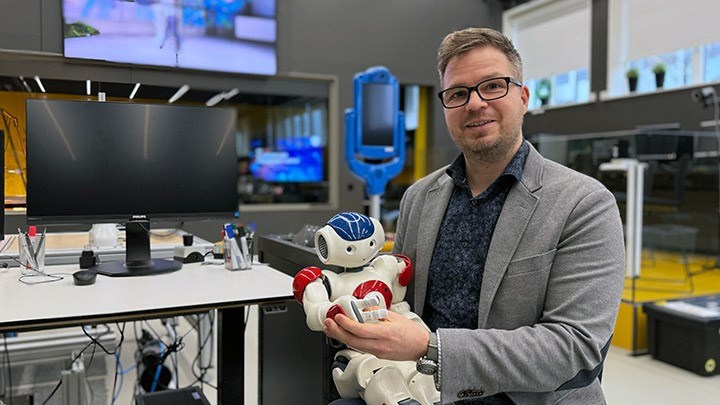How AI and robotics can help meet global health challenges

Learn to use artificial intelligence and robotics to contribute to better global health – while studying abroad and being awarded your degree from multiple countries.
“We are delighted that we can offer our students this opportunity,” says Johannes Andreas Stork, AI researcher at Örebro University and programme coordinator of Örebro University’s new master’s programme.
Hi there Johannes Andreas Stork, what makes this programme unique?
“The programme combines cutting-edge expertise in AI and robotics with ethical considerations and practical applications in global health. It is offered in close collaboration with leading research environments in Sweden and Europe. As a student, you apply and are admitted to one of the specialisations at either of the three universities.”
The programme is offered in three different countries, what does that entail?
“The programme is what is known as a multiple degree programme, which means that you do parts of the programme abroad and graduate with, in this case, a master’s degree from several universities. This is a way for us to strengthen the links between Örebro University and other higher education institutions in Europe. As a student, you will be registered on one of the programmes at one of the universities.”
Who do you think should apply for this programme?
“It suits anyone who has a bachelor’s degree within technology and wants to go into the field of advanced AI and robotics. It will allow you to explore how intelligent systems can understand, interact and support humans – with global health as the practical area of application. The programme also has an excellent set-up for those that want to study in an international environment and develop both technical and cross-disciplinary competence and skills.”
What opportunities open up for students afterwards?
“As a graduate of this programme, you will have access to an international job market where AI and robotics change how we work with health, welfare and sustainable development. You will be qualified for roles as an AI specialist within healthcare technology, a developer of social robots, or a human-robot interaction specialist. The skills gained are sought after within research, public institutions and industry alike – in Sweden and internationally. The programme also prepares you for a research career or for working in projects where AI and robotics are used to meet global health challenges,” says Johannes Andreas Stork.
Study abroad for a multiple degree
The new master’s programme is a collaboration between three European universities: University of Tours in France, University of Suceava in Romania and Örebro University in Sweden. The two-year programme provides students with knowledge and tools that enable them to contribute to technical solutions to global health challenges.
Students choose from the start whether they want to take their second semester in France or Romania. This means that there are two different programmes to apply for – one for each of those countries.
- Master’s Programme in AI, Data Science and Social Robotics Applied to Global Health (second semester in France).
- Master’s Programme in AI, Human-Machine Interaction and Social Robotics Applied to Global Health (second semester in Romania).
Application opened on 15 October, and the programme will start in the autumn semester 2026. For students from Sweden and EU member states, tuition is free.
